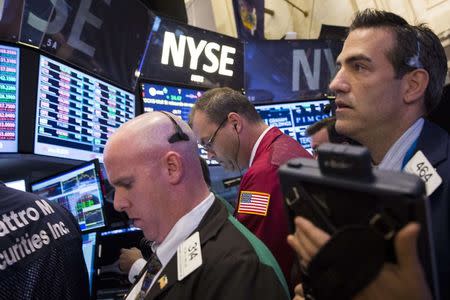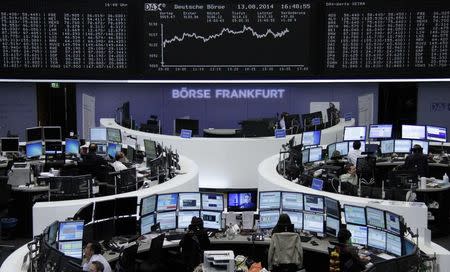Stocks up on Putin comments, bond yields fall
By Herbert Lash NEW YORK (Reuters) - Global equity markets edged higher on Thursday after President Vladimir Putin of Russia sounded a conciliatory note over the crisis in Ukraine, while bond yields in Europe fell to record lows as the euro zone's recovery stalled in the second quarter. Putin told Russian ministers and members of parliament in Crimea that Russia would stand up for itself but not at the cost of confrontation with the outside world, easing off months of tough rhetoric over Ukraine. Stocks on Wall Street rose, following gains in Europe, where equity markets have tumbled in past weeks on fears of an escalation of tensions between the West and Moscow over Ukraine. "The situation in Ukraine will only become a problem if it gets much worse, and right now it doesn't seem like that's going to be the case, which is helping the market hang in there," said Brian Battle, director of trading at Performance Trust Capital Partners in Chicago. The pan-European FTSEurofirst 300 index .FTEU3 rose 0.28 percent to close at 1,329.14, and MSCI's all-country world index .MIWD00000PUS rose 0.36 percent. On Wall Street, the Dow Jones industrial average .DJI closed up 61.78 points, or 0.37 percent, to 16,713.58. The S&P 500 .SPX gained 8.46 points, or 0.43 percent, to 1,955.18 and the Nasdaq Composite .IXIC added 18.876 points, or 0.43 percent, to 4,453.001. Bond yields dropped to record lows across the euro zone, and the euro hovered near its weakest in nine months after Germany reported its economy shrank in the second quarter, fueling expectations of more European Central Bank stimulus. German 10-year bond DE10YT=TWEB yields briefly traded below 1 percent for the first time, falling to 0.988 percent, according to traders who contribute data to trading platforms. Spanish and French bond yields also plumbed record lows. Benchmark 10-year U.S. Treasuries US10YT=RR rose 8/32 in price, pushing the yield down to 2.3997 percent. A surprise 0.2 percent contraction in economic output in Germany, the euro zone's growth engine, and stagnation in France halted the currency bloc's recovery. Analysts polled by Reuters had expected the euro zone to eke out a 0.1 percent quarterly expansion. ECONEZ Persistent fears about Russia's aid convoy to eastern Ukraine, which Kiev and the West reckon could be a pretext for an invasion, also helped intensify demand for lower-risk U.S. and German government debt. "These events are pushing German and global yields lower," said Andrew Mulligan, head of global strategy at Standard Life Investments in London. "Some of the engines of growth in Europe, especially Germany, are slowing. France and Italy are showing stagnation." The euro rose from near nine-month lows against the dollar EUR=, trading 0.01 percent stronger at $1.3366. The dollar also traded up slightly against the Japanese yen JPY= at 102.46. U.S. crude oil prices fell more than $2 a barrel and retreated more than 50 cents in a minute at one point as shares of the exchange-traded U.S. Oil Fund USO attracted high-volume trading. U.S. crude CLc1 for September delivery settled down $2.01 cents at $95.58 a barrel. Brent crude for delivery in September LCOc1 fell $2.27 to settle at $102.01. (Additional reporting by Sujata Rao in London, Reporting by Herbert Lash; Editing by Dan Grebler and Chizu Nomiyama)


